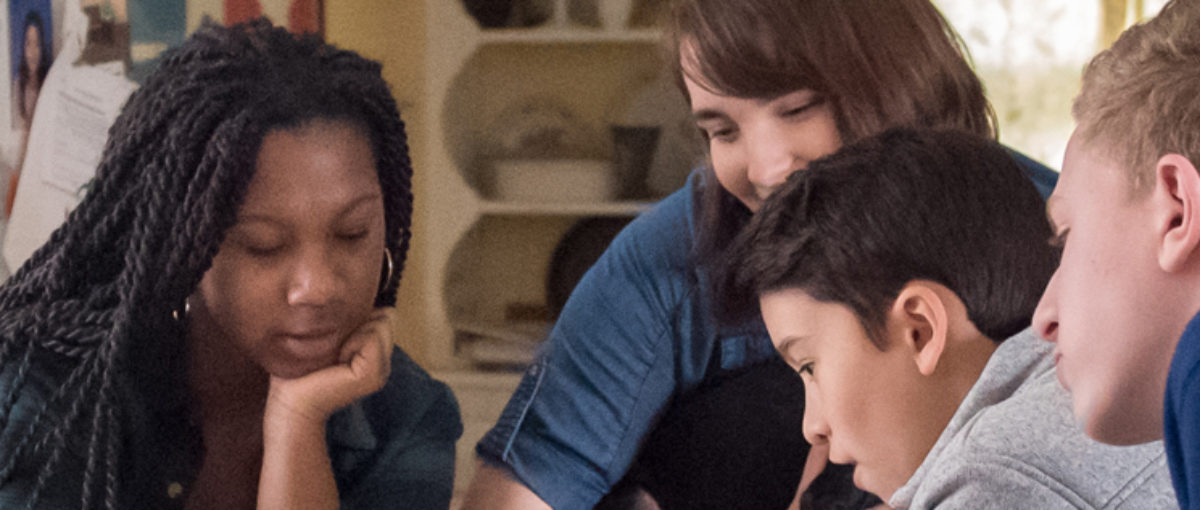
The Power of Teens
iThrive co-designs games with teens, educators, mental health experts, and professional game developers to discover how play and design can empower teens to thrive. But why do we care about teens?
First of all, we know teens face tremendous pressures. Just a few of them are:
-
- Anxiety and depression are on the rise
-
- Inequities in learning opportunities continue to grow
-
- Our education system fails to provide engaged and effective learning
-
- Teens are bored, overtested, and afraid in schools
- Society's judgment that teens are not capable of making decisions or contributing meaningfully to the world
Researchers at MIT who study teens have even said, "The bottom-line message that emerges from research on adolescent development and parenting is that teenagers are vulnerable. Their boldness and bravado mask an inexperience in solving problems and coping with stress that is often no match for the unsupervised, risk-laden environments in which they live." - The MIT Raising Teens Project
But this deficit perspective-focusing only on the risks and vulnerabilities of adolescence-is incomplete; it overlooks the incredible potential of the teen years.
Teens' brains are undergoing the last major restructuring of development, one nearly on par with the brain growth of early childhood. That means that the environments and interactions teens experience-good and bad alike-leave a deeper mark on the brain than they will in later years. That also means that the teen years provide the perfect opportunity to build habits to support a healthy, productive, and engaged life.
Teens are at a developmental moment defined by strength, not only vulnerability. After all, evolution has chosen this path of reorganization and susceptibility to environmental influences for the teen brain because it works!
At iThrive, we see teens' very unique developmental characteristics as a clear call to action. It is our mission to offer teens opportunities to build skills and flesh out their understanding of the world within supportive environments. What's more, we have to make sure those opportunities are compelling and playful. Learning happens best during play, even in the teen years.
That's why iThrive's approach to teen thriving is two-pronged: Offer skill-building opportunities directly to teens AND enhance the environments where teens are spending their time, all with their input at the center.
[Related article: We Can't Design Games for Teens Without This]
We use games and game design to connect with teens in meaningful ways that take their realities and interests to heart and invite them to gain confidence in themselves and their abilities.
[Related video: Game Design Studio]
But why games?
1. Games are where teens are.
Teens live, learn, and connect with others in virtual spaces as much as in physical ones. It's rare to find a teen without a smartphone nearby. That's why we work with teens to determine what they want their games to offer, and then draw on those insights-and the science of healthy adolescent development-to influence the games developers are creating.
[Related resources and events: iThrive Design Kits, iThrive Game Jams, and strengths-based game prototypes]
Since games are here to stay, let's unleash their power to engage and immerse teens while keeping teens' needs as whole people at the forefront of design.
2. Games reflect-and let us reflect on-truths about real life.
Games and game design are tools for building strengths and creating and sharing new models of how the world could be. That's because, at their core (and no matter how fantastical), games are systems that reflect and expand on truths about the lives we lead: they have rules, win/lose states, rewards, consequences, and many roles for players and other characters to fill. As friend of iThrive and expert game dev, Jason Vandenberghe, says:
"As we know, teens are in a part of their lives where they are absorbing information about how the world works at an extraordinary rate. If we want to make a large, positive change in our world, I believe the best route is to focus on providing teens with better models for the world."
At iThrive we are pushing on the limits of game design because we believe the games that teens play can and should reflect their truths and offer positive, compelling, meaningful, and strength-building content.
3. Games can help level the playing field.
Not all teens have equal access to high-quality learning environments, supportive and caring adults, opportunities deliberately designed to acknowledge and build on their unique strengths, or communities passionately committed to their well being and success in life.
iThrive is dedicated to identifying how carefully designed games can dismantle some of the inequities teens experience by cutting across settings to reach teens with strength-building, engaging experiences everywhere they are.

Teens face many vulnerabilities, it's true. But let's focus on addressing that not by trying to change, control, or overly shelter teens, but by meeting their needs and unleashing their incredible strengths through empowering, playful experiences.
Follow and join iThrive as we strive to raise up the voices of teens and meet them where they are to support their growth and well-being with compelling games and game design. Join us as we play to teens' strengths.
__________
About the Author



